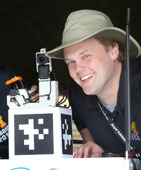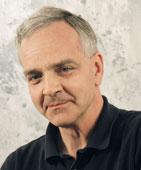 |
|
 |
|
| Symposium |
|
|
|
Keynote speakers
 |
Edwin Olson
Multi-Robot Autonomy and the MAGIC Competition |
|
Abstract:
Robots operating in challenging environments pose fundamental challenges in multi-agent state estimation, planning, and communication. These challenges become increasingly acute for large robot teams, but it is precisely these large teams that present the greatest opportunities for reconnaissance and search/rescue missions. Autonomy is critical, but current methods are not always up to the job; when (and how) can humans be effectively integrated into a multi-srobot team?
This talk will describe recent work in improving autonomous systems (including state estimation, planning, and communications) and the integration of humans into such a team. We will describe our experiences from the MAGIC 2010 competition, during which our 14 robots cooperatively explored and mapped an urban environment with the assistance of two human operators. Our team won the competition and $750,000; we attribute our success to improvements in our autonomous systems (which decrease operator workload, allowing our system to scale) and to good integration of humans into our system (which allowed us to recover when the autonomous systems failed). |
| |
Bio:
Edwin Olson is Assistant Professor of Computer Science and Engineering at the University of Michigan. He received a PhD from the Massachusetts Institute of Technology in 2008 for his work in robust robot mapping. During his time as a PhD student, he was a core member of their DARPA Urban Challenge Team which finished the race in 4th place.
Upon joining the University of Michigan faculty in 2008, he created the APRIL robotics lab, which studies Autonomy, Perception, Robotics, Interfaces, and Learning. In 2010, he led the winning team in the MAGIC 2010 competition by developing a team of 14 robots that semi-autonomously explored and mapped a large-scale urban environment.
For winning, the U.S. Department of Defense awarded him $750,000.
He is active in both the open source software community as one of the original developers of the message-passing system LCM, and the creator of the OrcBoard robotics controller. Much of his current software is available under open source licenses.
|
|
Multi-Robot Autonomy and the MAGIC Competition, Presentation > |
| |
|
| |
 |
Martial Hebert
Object recognition and modeling in daily living environments |
|
Abstract:
Recognizing objects in daily living environments, such as the home, remains a difficult task with its own specific challenges.
For example, objects may not lend themselves to standard feature matching techniques. They may lack distinctive markings and texture and they may have uniform surfaces with challenging reflection patterns. In addition, they live within high degree of clutter and occlusion that further complicates the task of recognition algorithms. Finally, since it is impossible to generate in advance models of all possible object instances, they need to be automatically generated from data in an unsupervised way. This talk reviews recent progress in recognition and unsupervised model building (discovery) from images and 3D data to address these challenges. These approaches are demonstrated and evaluated on challenging datasets and tasks. |
| |
Short Bio:
Martial Hebert is a Professor at the Robotics Institute at Carnegie-Mellon University. His interest includes computer vision, especially recognition in images and video data, model building and object recognition from 3D data, and perception for mobile robots. His group has developed approaches for object recognition and scene analysis in images and in video sequences. Recent development include scene understanding for mobile robots from images and 3D point clouds, and object discovery from unsupervised data.
|
Open source code for Alvaro Collet's MOPED system >
Open source for Abhinav+Efros' Exemplar SVM code > |
|
 |
|
|
|
 |
|
 |
|
|
|
|
|